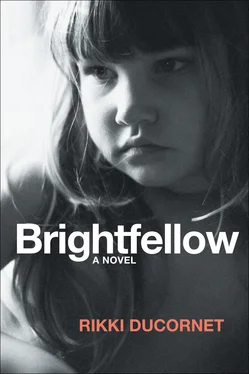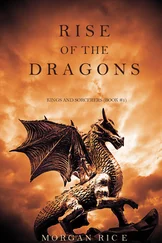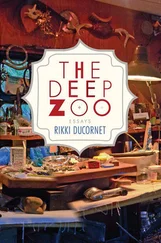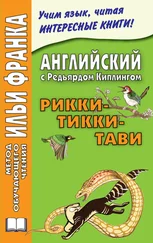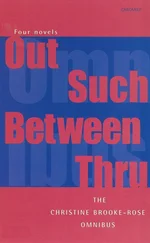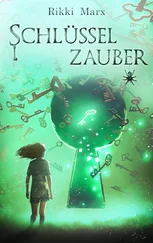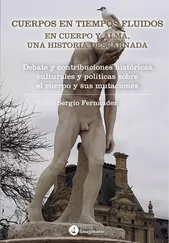“The Nadine. . the Nadine Lark Hettering Family Trust.”
“What of it?”
“Sponsored—”
“Oh. The Fulbright! Loon! The Eternal lasts only as long as its aspirations. ” She snorts.
“He’s much admired in Australia,” Charter says defensively. “Because of his interest, you know, in obscure islands. .”
“The obscurer the better!” Santa says. Billy hands her a cup of coffee.
“It’s fascinating, Santa,” Billy says. “Charter lived among the Mannja Fnadr.”
“The Mannja Fnadr. Er. . never heard of them.”
“Tell her about the Mannja Fnadr, Charter! Tell her about Noola!”
“God. Where is this place?” asks Santa. Billy scurries for the atlas, calling out as he does:
“Sing her the song! There’s a song !” Billy cries. “Charter knows it!” Charter does all he can to escape, but cannot. He has barely a notion of what he had improvised a week earlier over a supper of shad roe. He is sinking into a nightmare and desperately attempts to come up with something not too ridiculous.
“ Rapa ta runula ,” he begins in a strangled voice, “Ru nulu oho oho.” Santa asks what it means.
“Here we stand naked in the breeze—” Charter says.
“Indeed we do,” says Santa.
“The Noola is the tree; its leaves, the bird; its beak. .”
“Hm,” Santa exhales. “Where did you say this island is? Any connection to Easter Island? Loon was so taken with Easter Island.”
“It is actually quite far from Easter Island,” Charter says desperately.
“Well, what isn’t?” Santa fixes Charter with two very bright brown eyes.
Charter opens the atlas and points to a spot that is barely there.
“Ah,” says Santa. “Rurutu. Its scorpions and its bird gods. Rurutu. A wonderful name, isn’t it? It rolls of the tongue like a spoonful of oil. Rurutu! Noola! I want to go to Rurutu,” Santa says savagely, “and rub myself down with Noola.”
Billy has brought in more coffee and a plate of scones.
“What do they eat on Rurutu?” Santa asks, tearing into one. “Still baking, Billy! Thank god!”
“Ah, well. . the children—” Charter manages.
“The dear little ones. So cute the little ones. So sad they grow up into cannibals. One wonders why.”
“They’re not cannibals!” Billy interjects. “Charter says—”
“The hell they’re not.”
“They. Uh!” Charter thinks his entire upper body is blushing. “They would bring me eggs in little baskets of their making, green leaves and grasses. . you know. All woven together.”
“Oh, I don’t know, Charter. Which is why I asked.”
“Little blue eggs, rather like quail eggs. I don’t recall the names of the birds that lay them. They bake them on coals—”
“Perhaps they were the eggs of the Lulu bird. And the women. Are they perhaps all named Lulu, too, on Rurutu? The men called Roo? I bet my life they all go barefoot, except in the places where the thorny Noola grows.”
“The Noola has no thorns,” Charter tells her.
“Why not?” Santa asks. “Why not give the Noola thorns?” She smiles companionably as she says this.
Billy, wonderfully amused, chuckles, says:
“The world is a dream, after all! Why not invent all our islands!”
“Oh, but we do !” says Santa. “Here’s to the Noola and egg eaters of Rurutu, their Lulus and their Randy Roos, too!” She raises what remains of her scone.
“When the islanders have a feast,” Billy says gaily, “they slap their bellies like drums.”
“Of course they do!” Santa cries. “And I bet they whack the Lulus’ bottoms with a nice fat Noola spoon.” And then, thank heaven, she stops; Santa and Billy get into recollections of the old days, the people come and gone. When she leaves at last, she says to Charter at the door:
“Next time, Charter, dear, we will have to play cards. I do love to gamble, as I dare say you do, too. We will play Jack of Spades — do you know the game? I do! I know the game. ” She beams with evident malevolence. “It’s a great game for those who know how to bluff.” Off she goes into an afternoon as rich in the songs of insects and birds as any island paradise.

Charter is so undone he manages to drop any number of things on his way to the kitchen — coffee spoons, an empty dish. But Billy, always in good spirits it seems, does not mind and says only: “I have never seen Santa so playful, so animated! I had no idea she was such a tease. You’ve charmed her, Charter! I’ve not played Jack of Spades; you will have to clue me in!” And on and on — Charter, suddenly overcome, runs to the sink and vomits violently onto the small stack of dishes and cups. When he is done Billy gently mops his face and neck with a damp hand towel and insists he lie down. He walks Charter up the stairs, gently patting his back all the way, and helps him into bed. As Charter lies there in a panic, Billy arrives with a glass of ginger ale and sets it fizzing companionably beside him.
Almost at once Charter falls into a deep sleep. He sleeps until the middle of the night, when he is awakened by a nightmare.
He is walking on an island of black lava no larger than the Circle, surrounded by an ocean the color of ink. And Santa is walking beside him, saying:
“You see, there was nothing to your story. Nothing at all. You are naked, young man. As naked as an orange skinned within an inch of its life.”

Charter lies awake in the lifting dark of early morning, touching his body, prodding his flesh. Slender still, he can feel the start of a belly beneath his hand. His skin is pale, his hair pale, not quite red; freckles are scattered across his nose and cheeks. What little is visible of his beard appears almost white.
As the minutes pass his anxiety increases. He is a lonely child again, his is that foolish name: Stub. The name of a candle burned down to the last inches.
The day his mother left, his father took a hammer to the radio. It was as if he were murdering it. He carried it out back and hurled it to the ground. It bounced. He struck it until it was annihilated. He left the pieces where they lay, so that the backyard became a place neither of them ever wanted to go. The little vegetable garden was abandoned and the flower beds overtaken with brambles. The grass grew, the weeds; soon the sumac took over. The front yard was abandoned and in no time became overloaded with junk. The house was also the place where his father kept the things he thought one day he could make over and sell. Broken toilets, sinks, iron bedposts, and such. He bought a rusted-out truck and used it to haul away whatever people no longer wanted. Stub felt lost submerged in all that broken stuff. He knew that he, too, was not wanted. If it had not been for Axel, the library, the campus, and the woods he thinks he would have fallen to pieces. Like he is now. There is a thread of darkness, a soiled thread, that runs through everything. He is weary and afraid. He lies alone in a borrowed room, adrift. Outside, the world starts up again, but he is somehow excluded from its cohesion. The sound of birds calling up the sun begins.
Soon the Circle is illuminated. A puppy runs around barking. Charter lies in bed barely breathing. If he stands his heart will stop. How will he manage to stand up again? The world is a riddle, Vanderloon has written, an absurd invention we attempt to dignify. When he smells breakfast he does all he can to pull himself together. When he enters the kitchen, Billy runs to embrace him.
Читать дальше
